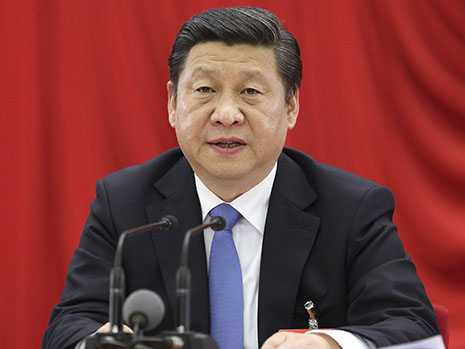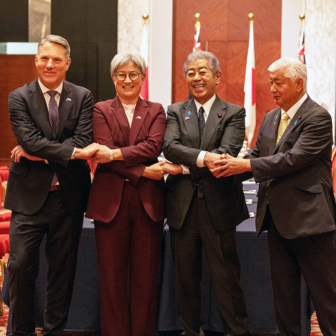THE document issued by the Chinese Communist Party’s central committee on 16 November, four days after the party plenum in Beijing, opens in grand and comprehensive style. “Reform and opening-up,” it declares, “has been a crucial choice that China has made regarding its destiny in modern times. But there can never be an end to the need for the emancipation of individual thought or for continuing reform and opening-up. China must deepen its all-round reform with a new starting point.” Although this is by no means a repudiation of the past, the statement signals the need for a new beginning, and is accompanied by a list of proposed priority areas. But lingering over the text – the first detailed statement based on the consensus of the new Chinese leadership – was the usual question raised by the central committee’s announcements: how will this bold, sweeping plan be implemented?
Chinese leaders have frequently uttered bold words over the past few years. In 2007, former party secretary and president Hu Jintao used the word “democracy” over sixty times when he addressed the party congress. He talked of “public participation in decision-making,” of the need for open governance and accountability, and of the drive to achieve sustainable growth with people as the key. But this language soon gave way to the reality of the Tibet uprising in early 2008 and the beginnings of the global economic downturn later that year. Hu’s aspirations went on hold and the overwhelming objective of the government was growth, growth and then more growth.
It was this addiction to growth at all costs, and a recognition of the need to slowly wean the country off it, that was a major underlying theme of the 2013 plenum. The simple fact is that most observers now agree China’s years of double-digit boom are over. Growth will still be solid, but it won’t be stellar. The political focus is shifting elsewhere, and the urgencies behind this document are different from those of Hu’s grand talk in 2007. The imperative is more about addressing the very mixed social and political results of those years of growth and wealth creation, issues that are complex and demanding and which Hu and his fellow leaders didn’t address for the simple fact that they never had to. For them, the great get-out card in any political bind was to look people in the eye and say, “Stick with it because tomorrow is going to be better.” And tomorrow, during their time in office, always was.
The plenum document operates in many ways like a party manifesto before an election in the West, with the critical difference that this one appears after the “election” has taken place. It sets out a broad strategic focus and alludes to the areas in which people’s expectations can be stoked, and this translates into the same mixture of fluffy and harder targets that can be found in any political manifesto. Justice is promised to all; so too is sustainability and equity. Implicit is a recognition that over the past few years China’s justice system, its growth model and its social balance have all been under pressure, and that these pressures create demand for unprecedented change and adaptation. The party is going to need a new framework to deal with these issues as China evolves towards an urban, middle-income society, the explicit aim of the party for the next decade.
There are clear political risks in this document. The first lies in its unequivocal declaration that the country must remain under the unified leadership the party. Those who speculate about the party’s power imperium in China being phased out by a gradual march to a multi-party future must face up to the party’s non-negotiable, irrevocable and privileged role, reiterated at the head of the statement. Everything but that is up for discussion.
Second, the statement very clearly sets out the functions of the market. It is a tool for delivering what Li Keqiang, the premier, has called “fast, sustainable growth.” With a falling GDP growth rate, and the rest of the world still limping along with suboptimal growth, the only way for China to maintain such a rate is to create within itself spaces for growth, and the easiest way to do that is through efficiency. It doesn’t matter if growth comes from state-owned enterprises, or SOEs, or from non-state companies. Energy, water and resources – the price-managed utilities, until now subsidised and controlled – are being brought into the market like everything else. China will soon be yet another country full of people complaining about their exorbitant energy bills. The government is making the big calculation that it is only in this way, despite citizen and consumer complaints, that the vast state companies supplying these services can be dragged towards modernisation, sustainable operation and profit. For the SOEs, the fat years are coming to a close.
There is a sound political reason, too, why SOEs need to be reined in. They have become domains for vested interests, political power blocs for networked groups – like those around the oil industry – whose obscene profits have made their beneficiaries complacent and lazy. Creaming the fat off the state today and not thinking about leaner tomorrows is a threat to the party’s stable rule; in markets, Xi Jinping and Li Keqiang have the one and only tool that can deal with this problem without calling down on their heads the many cliques and bundles of kindred interests that make up the party.
With an eye to popular sentiment, the plenum document promises reform of the increasingly contentious household registration system, which has tied millions of Chinese to their home towns. This reflects the main direction of policy, clear not just in the document but also in Li’s comments over the last few months: that China will become an urban country in the next decade, with as many as 70 per cent of the population living in cities. In a country like that, the political terrain will be radically different even from that of today. Middle-class consumers will outnumber farmers. Vast numbers of migrant labourers who have made great sacrifices to deliver growth, working in China’s factories and cities, cut off from their families and welfare networks, will expect a payback from society for what they have achieved over the past three decades. The plenum has targeted the inequality between rural- and urban-registered people, and in so doing put the rest of the party on notice that the years of dithering over precisely how to achieve the enfranchisement of hundreds of millions of new urban residents must end. Those who stay in the rural areas, meanwhile, will get something that matters a lot to them – secure land and property rights.
As this plenum makes clear, an urban China achieved at this speed and on this scale will also mean a China with different participation and governance structures. But not multi-party anarchy, as the party has made clear in harsh declarations like Document Number Nine, issued early in the year, which forbids discussion of Western-style parliamentary systems and other democratic approaches. Deepening grassroots democracy is seen as more appropriate, and that suggests a future in which politics in China becomes increasingly local and provincial officials have more powers to raise and disburse taxes. The need for a clean cadre of worthy, hard-working provincial power-holders is clear. On this model, grassroots democracy means reducing the spaces of governance in China to a size where people might actually feel they can be heard. Interestingly, the plenum 2013 document doesn’t refer explicitly to one means of trying to do this – township elections, which have been used over the past decade. Perhaps this is simply because the document is, like any political document, an exercise in positioning, and a more explicit move to introduce accountability through public, multi-candidate (but not multi-party) elections will be spelt out in detail in the future.
The 2013 plenum document can be seen as an initial map of the road towards a China that is urban and more marketised, a China within which the state becomes less deeply integrated in commercial operations and more supervisory and evaluatory. It envisages a society in which politics is local and the party is still strong, but the parameters of the government are scaled back and circumscribed in ways that make governing more manageable.
This remains the most contradictory aspect of the plenum vision. How can the party remain in its special zone, unhampered by constitutional and other legal restraints, while the government is increasingly placed under regulatory restraint and regimes of accountability? Can they say they are controlling and restraining themselves, yet allow themselves to remain utterly free? In other words, can China’s leaders really have their cake and eat it too? What’s clear in this plenum document is that this is precisely what they are intending to try. •
Kerry Brown is Director of the China Studies Centre at the University of Sydney.




